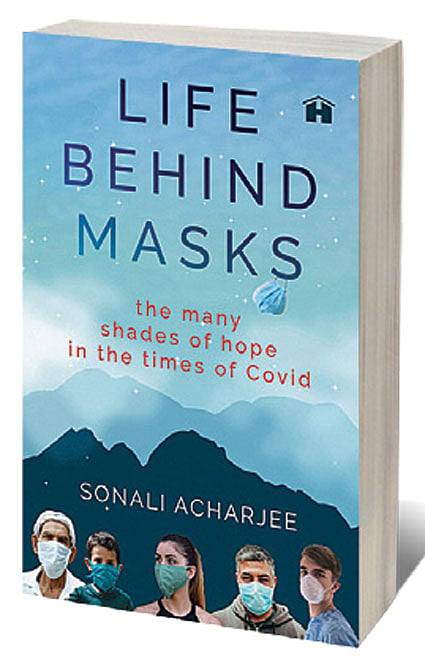Covid: Loss and Hope

THE LITERATURE AROUND Covid-19—Covid-lit, as I prefer to call it—has been steadily gaining traction, readership and popularity. It spans the gamut—from Coronavirus: A Book for Children by Elizabeth Jenner, Kate Wilson et al to Till We Win: India’s Fight Against the Covid-19 Pandemic, co-authored by Dr Randeep Guleria, Director, AIIMS, New Delhi, Dr Chandrakant Lahariya and Dr Gagandeep Kang.
And when journalists gate-crash the party, sparks are bound to fly. Sonali Acharjee, veteran journalist who has worked with a number of publications, including this magazine, and who currently covers health for India Today, jumps into the fray with Life Behind Masks.
A collection of twenty-one stories grouped around three themes—Love, Loss and Duty—it is a topical and entertaining read. As Acharjee says in her introduction, she attempts to distil people’s ‘loss, dreams, confusion and memories’. In this she succeeds. Largely.
It is interesting to deconstruct the book to examine the arsenal of techniques and strategies employed by the author to grab the eyeballs of what appears to be her chief audience—millennials. Right off the bat, she uses intriguing chapter headings to evoke curiosity. Sample these—‘He is My Father’, ‘A Girl and Her Screwdriver’ and my personal favourite—‘Would You Like an Apple?’—about a millionaire reduced to selling fruit to survive the challenge of the disease.
Openomics 2026: Continuity and Conviction
06 Feb 2026 - Vol 04 | Issue 57
The performance state at its peak
Acharjee’s second device is to keep her stories short and crisp, to cater to the short attention-span of today’s reader. The prose is precise and direct and none of the pieces exceed a dozen pages. Each story is self-contained—which makes the book an ideal one to read on-the-fly.
Thirdly, Acharjee wisely chooses to use Covid-19 only as a peg to hang her stories on. This avoids monotony and repetition. The range of issues tackled by her are diverse and pertinent—from menstrual hygiene to neo-natal mortality, to attacks on health workers and how to sensitise children to the pandemic. There is also a poignant pen-picture of a young Muslim girl caught in the unforgiving East Delhi riots of recent memory (‘The Pages of My Quran’). The challenge of vaccine development is seamlessly woven into another narrative, namely, ‘A Dose of Covaxin’.
Next, Sonali seems to be on a mission to educate the reader. Nothing preachy, just bite-sized bits of medical information, be it about cytokine storms or silent hypoxia. The author makes the virus that much easier to understand.
Finally, the sheer variety Acharjee showcases is nothing short of mind-boggling. Apart from life-experiences this extends to demographics (eight years to ninety-eight), geographies (Shillong to Palakkad), and classes (nurse to millionaires).
In essence, the theme of Acharjee’s book is hope in times of terror, ignorance and depression. Many of the stories celebrate the resilience of the human spirit in the face of the pandemic.
Shortcomings? Hardly any. The proof-reading, however, could have been sharper. More pertinently, some of the stories do not work. Obviously, each reader will have her personal favourites. But, for me, the weak links were ‘A Journey through My Journal’ and ‘Me Against the Media’. Surprising, since both dealt with the author’s home-turf! But these are minor niggles. Acharjee deserves kudos for adding to our knowledge of the disease in an interesting way, through heartfelt stories. A classic example of edutainment.

